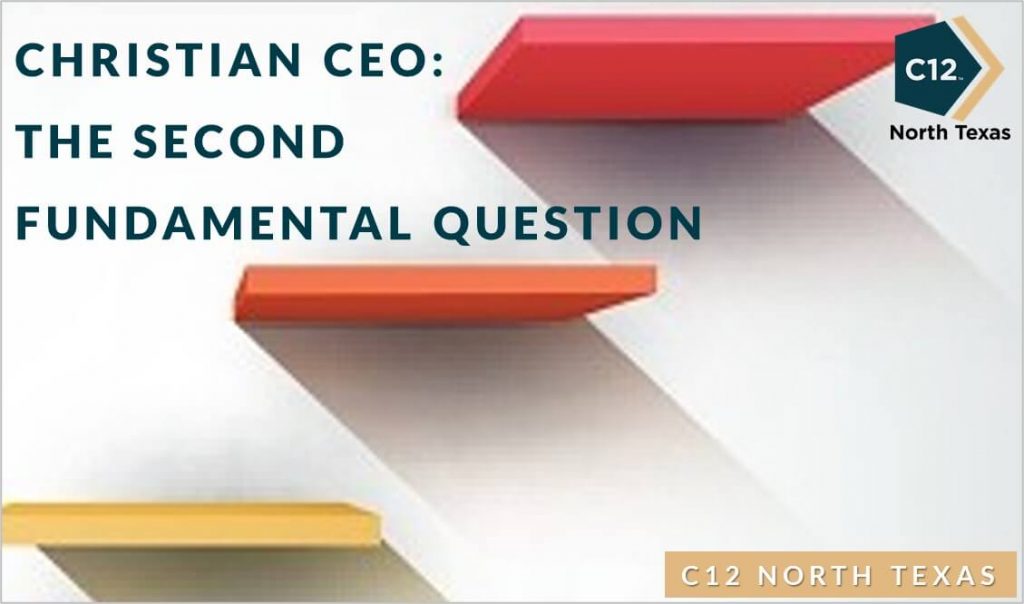Our Promise to
Every Member
We promise to be an example of all we promote, to be accountable to our members and to seek their correction when any deviations appear. We serve as a resource for education, encouragement, challenge, inspiration and accountability.
Christian CEO: The Second Fundamental Question

The famous Christian author and apologist, C.S. Lewis, famously formulated three possible answers to the fundamental question, “Who is Jesus?” Jesus, he said, was either a liar, a lunatic, or lord. (His reasoning assumed the Jesus lived on this earth as a real person and made deity claims about himself. Few people dispute the historical Jesus.)
One could assert that Jesus said many things and knew that some or all were untrue. That would make him a liar. Or, he might have said those things but was mentally unhinged. That would make him a lunatic. Finally, all his claims were true. That would make Lord, quite unlike any other person that ever lived.
These three choices, then, confront every person. The answer believed addresses the first fundamental question and, theoretically, directs a person’s life from that point forward. Is it that simple?
At the C12 Group, we serve Christian CEOs and business owners. Our role is to encourage, instruct, and coach them on how to build great businesses for a greater purpose. When we are successful, that means that their companies will thrive (e.g., more customers, more profit, more growth). The “greater purpose” objective means that their business will become a ministry platform to affect potentially thousands of people inside and outside of their company. It is the eternal impact that makes the greatest difference.
Our members are professing Christians from all sorts of churches. They have affirmatively answered that “Jesus is Lord” (not a liar or lunatic). So, are we done here? Do they understand and apply Biblical priorities and teachings to their business? Is it common for them to defer to God when questions or crises inevitably occur? In short, who gets to decide what in their business and their life?
The Second Fundamental Question
This leads to the second fundamental question. It is not so much “who is Jesus?” (that has been decided). Instead, it is “what role does Jesus have in my life?” The answer to that question determines how we make decisions, what we prioritize as important, and what we define as “success.” Three possible responses show where you and I place him in our day to day lives.
He could be lower, level, or leader.
If Jesus is “lower,” then what we decide is unquestionably most important. Jesus would have little opportunity to influence us, never mind our business or ministry. A Christian business owner might occasionally defer to God, but that typically only comes in the direst circumstances when all other solutions have failed. The “things of God” would get little attention. We would devalue Jesus’ great mission to reconcile a lost world. And trying to become more like Jesus would lose out to more temporal standards (e.g., being a good person, making a lot of money, having above-average qualities). Too many believers have effectively placed Jesus low in their lives.
If Jesus is “level,” then we acknowledge that he is just as important as we are to ourselves. He becomes a co-equal and trusted advisor. For many, elevating Jesus to this level is a significant step of spiritual maturity. It at least pulls Jesus from the irrelevant noise and gives him some status in our commonly self-centered lives. We begin to consider what he might want from us and what he might want us to become. We add his ideas to ours so that we can make our decision about our best course of action. However, control remains important so that even while he is level with us, we usually retain the final decision-making authority. It is a shared arrangement. Sadly, it is not so level as we might imagine. It is an illusion of equality and, ultimately, unsatisfying. To imagine that we are equal to Christ is a tragic spiritual conclusion.
If Jesus is “leader,” then all self-centered thinking is off. All standards get adjusted. Jesus gets to set the vision, determine the priorities, and make every decision affecting our life and business. Wow, you might think, how is that possible when there is so much to decide each day? Can Jesus (God) possibly know the complexities of 21st-century business life? Can he be trusted to make the right decisions at the right time? These tensions war against firmly submitting to Jesus in life. Though we intellectually may have reached theologically sound answers, we regularly stumble in the practical applications. Yet, the path to freedom and eternal significance comes from willful submission to the transcendent God. Is it not reasonable that a God that created the universe might be able to master running a business? And if he also has demonstrated that he loves us, is that not enough to trust him with the direction of our lives and businesses? Our role, then, becomes to listen to him intently, follow his example explicitly, and submit all decisions to him without exception. Let him be the leader.
Lower, level, or leader – where you and I place Jesus matters.
We exist at C12 to help each other let Jesus lead every aspect of our lives. He is trustworthy. He is powerful. He is Lord.

Tom Hawes is the Principal Chair for C12 North Texas. Since 2011, Tom has had the pleasure of facilitating groups in North Texas. Contact him at [email protected] or 214-620-9366.
Recent Blog
Archives
2020
-
September (1)
-
August (3)
-
July (1)
-
March (4)

